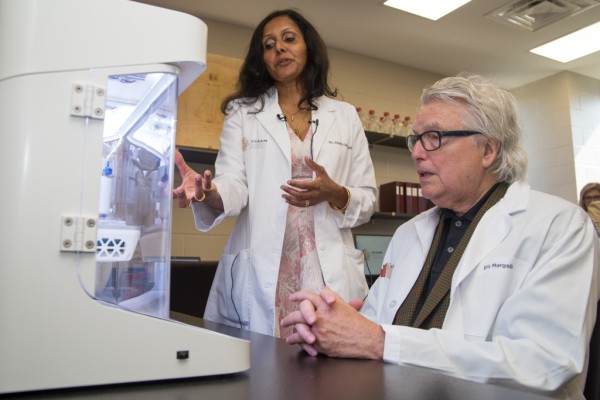 Dr. Charu Chandrasekera, Executive Director of the Canadian Centre for Alternatives to Animal Methods (CCAAM), explains to Eric Margolis how the lab utilizes 3D printing to produce replicas of human tissues and organs for research during CCAAM's grand opening on Thursday, Oct. 10, 2019.
Dr. Charu Chandrasekera, Executive Director of the Canadian Centre for Alternatives to Animal Methods (CCAAM), explains to Eric Margolis how the lab utilizes 3D printing to produce replicas of human tissues and organs for research during CCAAM's grand opening on Thursday, Oct. 10, 2019.
A new research lab dedicated to developing, validating, and promoting non-animal, human biology-based platforms in biomedical research, education, and chemical safety testing celebrated its grand opening Thursday at the University of Windsor.
Eric and Dana Margolis, from the Eric S. Margolis Family Foundation, were on hand to tour the Canadian Centre for Alternatives to Animal Methods (CCAAM), established with a $1 million donation received from the couple last year. In recognition, the Centre’s main research and training laboratory will be named the Eric S. Margolis Research and Training Laboratory for Alternatives to Animal Methods. The funds will also support academic program development.
Charu Chandrasekera, CCAAM’s Executive Director, says research in the lab is aimed at understanding human biology in health and disease using complex human cell and tissue-based models.
“We study human biology at every level of biological function — DNA, pathways, cells, tissue, organ, and systems level. We can use human cells from cadavers and from surgical remains; we can engineer tissues and small organs called organoids from adult stem cells; we can even use 3D printing to produce replicas of human tissues and organs for research.”
Dr. Chandrasekera says artificial intelligence and high-performance computers provide the ability to model human biology to an unprecedented level of detail and run simulations that would never be possible with animal studies.
The work is a step in the right direction to Eric Margolis, who was an internationally syndicated journalist, as well as former owner and chairman of Jamieson Laboratories. His focus is now on animal welfare issues.
“I like to have my name on an organization that is active and at the forefront of progress in this area, where very little has been done and a great deal remains to be achieved,” he said.
University of Windsor President Robert Gordon says he is extremely grateful for the vision of the Margolis Foundation in supporting research that has the potential to greatly improve human health.
“This very generous donation will not only play an important role in developing novel ways of conducting human health research in the lab, but the education and training component means that our students will have an opportunity to learn in a unique setting that supports their academic growth – an ideal combination. I couldn’t be more thrilled.”
For more information on CCAAM, visit: http://www.uwindsor.ca/ccaam/
